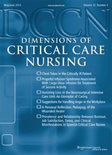
Dimensions of Critical Care Nursing
Scope & Guideline
Shaping the Future of Critical Care with Cutting-Edge Research
Introduction
Aims and Scopes
- Patient-Centered Care:
The journal emphasizes research and practices that enhance patient-centered care in critical care settings, focusing on the experiences, needs, and outcomes of critically ill patients. - Quality Improvement and Safety:
A core focus is on quality improvement initiatives that aim to enhance patient safety, reduce hospital-acquired infections, and improve overall care delivery in intensive care units. - Interprofessional Collaboration:
The importance of teamwork and collaboration among healthcare professionals is highlighted, with studies exploring the effectiveness of interprofessional education and practice. - Nurse Education and Empowerment:
The journal addresses the critical role of education in nursing practice, providing insights into educational strategies that empower nurses and enhance their competencies in critical care. - Innovative Nursing Interventions:
Research on novel nursing interventions and their impact on patient outcomes is a significant theme, showcasing evidence-based practices that improve care in critical care environments. - Mental Health and Well-Being of Nurses:
The mental health and well-being of nurses, particularly in high-stress critical care environments, is increasingly recognized as vital, with studies exploring factors contributing to nurse burnout and strategies for resilience.
Trending and Emerging
- Impact of COVID-19 on Nursing Practices:
Research exploring the implications of the COVID-19 pandemic on nursing practices, mental health, and patient outcomes is increasingly prevalent, reflecting the ongoing relevance of this global health crisis. - Wellness and Resilience in Nursing:
An emerging focus on wellness and resilience strategies for nurses is evident, as studies aim to identify interventions that support nurse mental health and job satisfaction. - Use of Technology in Patient Care:
There is a growing trend towards exploring the integration of technology in critical care, including telehealth, electronic health records, and innovative monitoring systems to enhance patient care. - Family Engagement in Care Processes:
Research on the role of family members in critical care settings is gaining traction, focusing on their involvement in decision-making, communication, and care processes. - Interprofessional Education and Practice:
The journal is increasingly publishing studies on interprofessional education and practice models that aim to improve collaboration and outcomes in critical care settings.
Declining or Waning
- Traditional Biomedical Approaches:
There appears to be a decreasing focus on traditional biomedical approaches to care, as the journal increasingly emphasizes holistic and patient-centered care methodologies. - Passive Learning Strategies in Nursing Education:
The journal has shifted away from passive learning methods, such as lectures, toward more active, experiential learning strategies that engage nurses in critical thinking and problem-solving. - Single-Dimensional Research Studies:
There is a noticeable decline in single-dimensional studies that do not incorporate comprehensive or interdisciplinary perspectives, as the journal now prioritizes multifaceted research approaches. - Generalized Quality of Life Assessments:
Research centered solely on generalized quality of life metrics without specific context related to critical care settings is becoming less frequent, with a trend towards more nuanced and condition-specific evaluations. - Focus on Technical Skills Over Soft Skills:
The emphasis on technical skills alone is diminishing in favor of a more balanced approach that includes soft skills such as communication, empathy, and emotional intelligence in nursing practice.
Similar Journals
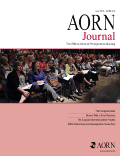
AORN JOURNAL
Innovating Surgical Practices for Better Outcomes.AORN JOURNAL, a reputable publication in the field of Medical and Surgical Nursing, has been at the forefront of nursing education and practice since its inception in 1963. Published by WILEY, this peer-reviewed journal serves as an essential resource for nurses, educators, and healthcare professionals seeking to enhance their knowledge and skills in perioperative care. With an impressive ranking of 15th out of 26 in its category according to Scopus, and a Q2 rating in the 2023 category quartiles, the AORN JOURNAL consistently provides high-quality research, innovative practices, and evidence-based guidance. While currently not an open-access journal, it offers valuable insights and practical solutions to complex challenges in surgical settings, making it a crucial tool for advancing the nursing profession. The journal's commitment to fostering excellence in patient care continues to empower professionals and students alike, ensuring they stay at the leading edge of medical knowledge and practice.
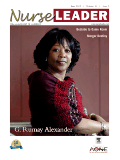
Nurse Leader
Navigating the Landscape of Nursing ManagementNurse Leader is a prestigious journal published by ELSEVIER SCIENCE INC, dedicated to the dynamic field of nursing leadership and management. With an ISSN of 1541-4612 and an E-ISSN of 1541-4620, this journal has been a vital resource since its inception in 2003, covering emerging topics and innovative practices that shape the future of healthcare leadership. As a Q3 category journal in the 2023 rankings, it holds a ranked position of #24 out of 40 in the Scopus Nursing Leadership and Management category, highlighting its significance in the academic community with a 41st percentile standing. Although not an open access journal, Nurse Leader provides valuable insights and research findings that equip researchers, professionals, and students with the knowledge and tools necessary for effective leadership in nursing. With a commitment to advancing the profession, the journal remains a crucial platform for sharing impactful research and fostering collaboration among practitioners in the United States and beyond.
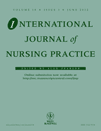
International Journal of Nursing Practice
Transforming patient care with cutting-edge nursing insights.International Journal of Nursing Practice, published by WILEY, is a premier academic journal dedicated to the field of nursing, with a keen emphasis on innovative nursing practices and advancements in healthcare. Established in 1995, the journal has successfully bridged a vital gap in nursing research and practice, featuring rigorous peer-reviewed articles that cater to both academic and clinical audiences. Rated as a Q1 journal in Nursing (miscellaneous) for 2023, it ranks at an impressive #29 out of 139 in General Nursing on Scopus, placing it firmly within the top 21% of its category. The journal serves as an essential resource for nursing professionals, researchers, and students alike, fostering evidence-based practices and enriching the global discourse in nursing. With an increasing focus on interdisciplinary work, the International Journal of Nursing Practice aims to enhance the quality of care provided to patients and support the continuous education of healthcare providers. Stay updated with cutting-edge research and share your contributions to this dynamic field!

International Emergency Nursing
Advancing emergency care through global insights.International Emergency Nursing is a distinguished journal dedicated to advancing knowledge and practice within the field of emergency nursing. Published by ELSEVIER SCI LTD in the United Kingdom, it has earned a prestigious place within the academic community, boasting a Q1 ranking in Emergency Nursing and ranking 6th out of 32 in its category according to Scopus metrics, placing it in the 82nd percentile. This journal provides a vital platform for researchers, practitioners, and students to disseminate their findings, share best practices, and learn about the latest innovations in emergency care from its inception in 2008 to the present. Although it is not an open-access journal, it ensures that valuable insights and research are accessible to a broad audience, fostering collaboration and education within the field. The journal's commitment to enhancing emergency nursing practices has made it an essential resource for those engaged in improving patient outcomes in critical care environments.
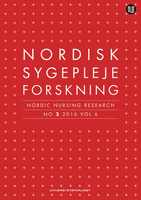
Nordisk Sygeplejeforskning-Nordic Nursing Research
Advancing nursing excellence across the Nordic region.Nordisk Sygeplejeforskning-Nordic Nursing Research is a key journal dedicated to advancing the field of nursing research within the Nordic countries. Published by Scandinavian University Press-Universitetsforlaget AS, this esteemed journal focuses on the dissemination of original research, reviews, and theoretical discussions that contribute to the understanding and development of nursing practices across diverse healthcare settings. Though currently not an Open Access publication, it is committed to providing insightful and peer-reviewed content, bolstering the scholarly dialogue in nursing. With its ISSN 1892-2678 and E-ISSN 1892-2686, Nordic Nursing Research serves as an invaluable resource for researchers, healthcare professionals, and students interested in evidence-based nursing methods and innovations. Positioned strategically to enhance nursing care quality and ethics, the journal fosters collaboration and knowledge exchange within the global nursing community.
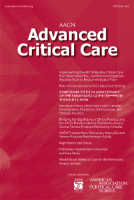
AACN Advanced Critical Care
Empowering healthcare professionals through innovative research.AACN Advanced Critical Care, published by the American Association of Critical-Care Nurses, serves as an essential resource in the field of critical care nursing and emergency medicine. With an ISSN of 1559-7768 and an E-ISSN of 1559-7776, this peer-reviewed journal is committed to advancing the knowledge and practice of critical care through rigorous research and innovative clinical insights. The journal holds a reputable position within its field, achieving a Q2 ranking in Critical Care Nursing and Emergency Medicine, alongside a Q3 ranking in miscellaneous Medicine categories for 2023. With a convergence of scholarly contributions from 2006 to 2024, it strives to explore the latest advancements and challenges in critical care environments, ensuring that its readership of researchers, healthcare professionals, and students are well-informed of emerging trends and best practices. The journal does not offer Open Access, however, its impact and relevance are evident from its Scopus rankings, which place it at a commendable #14 in Critical Care Nursing and #47 in Emergency Medicine. As a crucial platform for knowledge dissemination, AACN Advanced Critical Care plays a vital role in enhancing clinical effectiveness and improving patient outcomes in acutely ill populations.
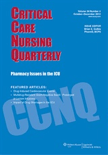
Critical Care Nursing Quarterly
Fostering Excellence in Patient-Centered CareCritical Care Nursing Quarterly is a distinguished journal published by Lippincott Williams & Wilkins, catering to the vital field of critical care nursing. With an ISSN of 0887-9303 and an E-ISSN of 1550-5111, this journal has been contributing to the advancement of nursing practices since its inception in 1987. Over the years, it has gained recognition, earning a Q3 ranking in Critical Care Nursing for 2023 with a Scopus rank of #9 out of 27, placing it in the 68th percentile of its category. As a non-open access journal, it offers a curated selection of high-quality articles designed to disseminate critical findings, innovative practices, and essential reviews relating to nursing in critical care settings. The journal's ongoing commitment to improving patient care through research and education highlights its pivotal role in shaping the future of critical care nursing. For researchers, professionals, and students alike, Critical Care Nursing Quarterly serves as an indispensable resource in a field that impacts lives daily.
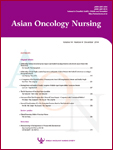
Asian Oncology Nursing
Transforming Patient Outcomes with Culturally Competent CareAsian Oncology Nursing is a pivotal journal dedicated to advancing the field of oncology nursing across the Asian continent and beyond. Published by the esteemed Korean Oncology Nursing Society, this journal serves as a platform for researchers, clinicians, and educators to disseminate groundbreaking findings and innovative practices in cancer care and nursing. With an ISSN of 2287-2434 and E-ISSN 2093-7776, it is committed to enhancing the knowledge and skills of oncology nursing professionals, thereby improving patient outcomes. Although currently not operating as an open-access platform, the journal emphasizes the significance of bridging the research gap in oncology nursing, fostering collaboration among professionals in the field. Given the increasing importance of culturally competent care in oncology, Asian Oncology Nursing positions itself as an essential resource for those who strive to elevate standards of care and educate future generations of oncology nurses.
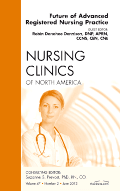
NURSING CLINICS OF NORTH AMERICA
Shaping the future of nursing with impactful contributions.Nursing Clinics of North America is a premier peer-reviewed journal published by W B Saunders Co - Elsevier Inc, providing a vital platform for the dissemination of innovative research and clinical practice insights in the field of nursing and medicine. With an impressive impact factor reflecting its relevance in academic circles, this journal falls within the Q2 category in both Medicine and Nursing disciplines, showcasing its importance to professionals and researchers. Established in 1966 and continuing through to 2024, it offers valuable contributions across a wide array of topics, facilitated by its Scopus rank of #41 in General Nursing and a 70th percentile ranking, marking it as one of the leading publications in the field. Although not an open-access journal, it provides subscription-based access to critical information that supports advancing nursing knowledge and practices. The journal is dedicated to enhancing the skills and understanding of nurses, healthcare professionals, and students, making it an essential resource for those seeking to excel in nursing and allied health professions.

Nursing-Research and Reviews
Advancing evidence-based nursing through innovative research.Nursing-Research and Reviews is a prominent open-access journal published by DOVE MEDICAL PRESS LTD, dedicated to the dynamic field of nursing research. Since its inception in 2011, this journal has served as a vital platform for disseminating peer-reviewed articles, review papers, and original research that contribute to evidence-based nursing practice and education. With an ISSN of 2230-522X, it provides valuable insights into the latest developments and trends in nursing, aiming to bridge the gap between academia and clinical practice. The journal's commitment to open access ensures that its content is readily available to researchers, practitioners, and students worldwide, promoting a broader dissemination of knowledge. As part of a reputable publisher recognized for its focus on advancing medical and scientific understanding, Nursing-Research and Reviews plays a crucial role in shaping the future of nursing through innovative research and inclusive dialogue.